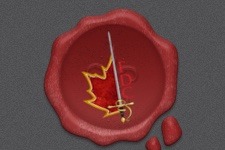Fight Directors Canada sets the standards for stage combat in this country, just like the Society of American Fight Directors does in the U.S.A. and the British Academy of Dramatic Combat does in the U.K. What are those standards, and what do the levels mean?
I hope to answer all your questions on FDC Certification here.
What is Basic Actor-Combatant?
At the Basic level of FDC, the actor learns the fundamentals of stage combat with three disciplines:
- Unarmed
- Single-handed sword
- Quarterstaff (two-handed weapons)
At this stage, the main focus is safety. There are several different ways that fight motions can be made safe for the performers while retaining the full energy and excitement for the audience. In other words, anything can be made safe by going slow or deliberately avoiding your partner. The real challenge is to deliver a convincing fight scene at full speed while maintaining complete safety.
Professional actors ought to have their Basic Actor-Combatant certification if they want to perform fight scenes. However, it is not mandatory and many producers and directors are unaware of the benefits of the course.
Yes, it is possible to learn the essentials in a few hours, but as a professional certification, the test is whether those essential skills can be applied to a full-speed choreographed fight while acting. So the course is 60 hours long to practice each safety method and incorporate it into a scene with dialogue and drama.
How do I Prepare for FDC Basic?
You should be physically fit and ready to do some mental work as well. You might ask yourself if you think you’re physically ready to learn some gymnastics.
You don’t need any previous experience in martial arts. In fact, it’s sometimes harder to break the habits of a martial artist who has been trained to do movements in a specific way that are dangerous. After all, that’s why they learned fighting skills in the first place.
Having acting experience and professional training from theatre school is always helpful for performance skills. Dance experience or other movement skills will make learning the physical side of things easier.
What is Intermediate Actor-Combatant?
For the Intermediate level, actor-combatants apply their safety skills toward more specific applications. To have precise actions instead of general ones, and a sense of the historical use of various weapons, the training has a higher standard. There are four disciplines at the Intermediate level:
- Smallsword (17th-18th century speedy single sword after Angelo, Hope, etc)
- Longsword (14th-16th century two-handed sword after Fiore, Lichtenauer, etc)
- Eastern Martial Arts (cultural styles from Japan, China, Indonesia, etc)
- Rapier & Dagger (a weapon in each hand after Capo Fero, di Grassi, etc)
The standards of performance are higher at this level. Smallsword is expected to be fast as well as precise. High kicks in martial arts are expected to be at head-height. Your lunges are expected to be long in R&D. And it all should be linked with passionate delivery of your dialogue in the scene.
How do I Prepare for FDC Intermediate?
Become an expert at the Basic skills, and follow-up on any feedback from your Basic exam. Your Instructor may do a little review, but you’re expected to learn the new material, not spend your time in class reviewing old material.
Practice writing your own choreography or take notes on action movies. Your observation skills and note-taking will come in handy.
What is Advanced Actor-Combatant?
In many ways, Advanced is a different type of challenge. If you successfully earn your Advanced, you are among the best stage fighters in Canada and the world. So, the five disciplines are not merely the minimum that FDC masters expect at this level, but are also used as a measuring stick to see how quickly you can pick up a new skill, how flawlessly you can execute it with minimal rehearsal, and how gracefully you take correction and work together with your partners. This is done through the lens of five additional disciplines:
- Advanced Smallsword
- Martial Arts Weapons (katana, escrima stick/knife, etc)
- Rapier & Companion (cloak, case of rapiers, lantern, buckler, etc)
- Broadsword & Shield
- Found/Environmental Weapons (thrown objects, flexible/articulated objects, clothing, etc)
This level is normally only done at the FDC National Workshop that happens once a year in the summer. To get a class together who are ready for Advanced is a rare thing, and there’s so much material to cover that putting aside the dedicated time with multiple instructors is difficult if it’s not coordinated throughout FDC.
How do I Prepare for FDC Advanced?
Get back to basics: be physically, mentally and emotionally ready for anything. Learn all kinds of new skills like juggling, parkour or pick up a traditional martial art to challenge your discipline and physical capacity.
What Certifications Are Beyond Advanced?
A Certified Instructor teaches the Actor-Combatant levels.
Fight Directors are Instructors who work professionally in theatres to choreograph and take responsibility for the safety of fight scenes and their artistic expression.
A Fight Master is a Fight Director who has enough professional experience to be chosen as a part of FDC’s leadership. They are the ones who evaluate all actors in their certification exams.
How do I Prepare for FDC Instructor Training?
There is a mandatory 2-year apprenticeship. During this time, you’ll work with one or more Instructors or Fight Masters as their assistant. You’re also required to be a “Journeyman” at a National Workshop which is like being an apprentice for all the staff. All in all, you’ll be guided through the process and doing your own research as well.
Ready to Begin?
Sign up for our next Basic Actor-Combatant course here. It’s a two-week intensive running from October 19 to 30, 9am to 5pm Monday to Friday.
